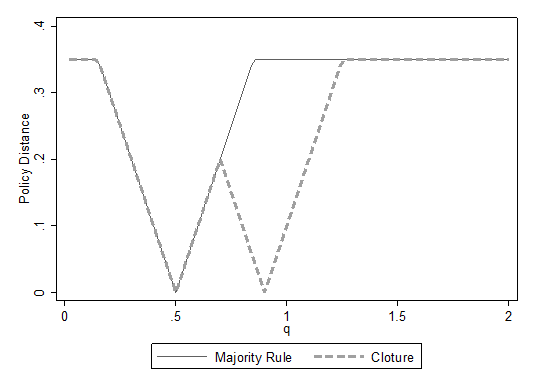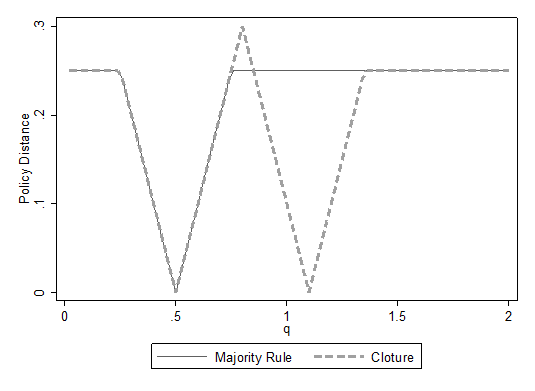
I try to avoid excessively nerdy tweets and threads. But here is one why Manchin is (and other moderate Senators) are likely to ever find it advantageous to support cloture reform (and a thought about how that could change) 1/n
The following figures are based on versions of the Pivotal Politics model which predicts policy outcomes (and payoffs) as a function of legislative preferences and the status quo ante.
Let me begin with a version where legislative proposals are made by the majority party median (for simplicity I assume that the majority party median is approximately the same as the president’s ideal policy – so I can ignore vetoes).
Let Manchin be the median senator and F be the filibuster pivotal member (the sixtieth most conservative in this example). First, I assume that Manchin is closer to F than he is to the agenda setter.
The plot shows the predicted distance between the final outcome and Manchin’s ideal point for all status quos q. 

Note the dashed line, reflecting the outcomes under the cloture rule is always at east as low as the solid line reflecting majority rule. Thus, the outcomes under cloture are always at least as good for Manchin.
What if Manchin is closer to the agenda setter than he is to F (personally, I find this unlikely)? The outcomes change a bit. 

Now Manchin can do better under majority rule, but only for a narrow range of status quos close to the filibuster pivot.
So Manchin almost always loses under majority rule. Why?
So Manchin almost always loses under majority rule. Why?
Because the agenda setter almost always extracts the policy surplus by moving policy as far to the left as Manchin will tolerate.
So what breaks this dynamic? Opening up the Senate agenda so that Manchin and Republicans can push back when the agenda setter goes too far. In fact, by virtue of the median voter theorem, all policy outcomes under majority rule would be Manchin’s ideal point.
So he would ALWAYS do better by eliminating the filibuster if party leaders also loosen up agenda control.
But should Democratic Party leaders given up agenda control in exchange for majority rule? It would cost them some more progressive policy outcomes.
But should Democratic Party leaders given up agenda control in exchange for majority rule? It would cost them some more progressive policy outcomes.
But the filibuster also costs them these opportunities. So there is no clear answer. Such a trade is bad for the party when status quos are extreme, but good when status quos would be otherwise gridlocked.
• • •
Missing some Tweet in this thread? You can try to
force a refresh


